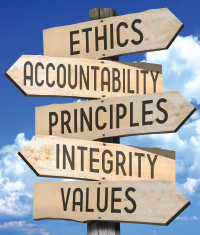
© 3D generator / shutterstock.com
Clinical Scenario
You’re chairing the faculty committee for your otolaryngology-head and neck surgery department. The committee is tasked with planning the forthcoming 2020-2021 otolaryngology match process at your institution. Owing to the pandemic crisis, new challenges are anticipated for this year’s match, and your committee is determined to plan a process that’s not only successful, but also ethical for all participants. You believe that, while significant obstacles need to be overcome, opportunities also exist to review the elements of your program’s approach that could emphasize and enhance integrity and professionalism, as well as demonstrate a commitment to ethical conduct.
Explore This Issue
September 2020Concurrently, the medical students at your institution who are planning to enter the otolaryngology match are anxious for faculty guidance and information that will be helpful to their preparation. As usual, these students have excellent grades, top standardized test scores, and have been actively engaged clinically and in research with department faculty. Still, the pandemic has affected medical education over the past quarter of a year, and they’re unsure how the match process will proceed. They feel “ungrounded” with respect to the potential changes in the application and interview process, and seek reassurance from your committee, the resident cadre, and their faculty advisors.
You and your committee are trying to assimilate all of the available information on formal and informal processes for the forthcoming match. Above all, you want to ensure, as much as possible, that the process will be fair and equitable, for the applicants and the program, and will reflect the ethical conduct and professionalism that’s expected of the profession. Fundamental to these goals is the identification of just what the ethical conduct of this residency match process should embody.
How can you navigate ethical challenges and student expectations in creating a match experience that’s fair for everyone?
Discussion
Over the past 70 years or so, the National Resident Matching Program process has undergone a significant series of changes and improvements, perhaps most notably with the advent of computer-based matching algorithms. When this author applied to various residency programs for selection, otolaryngology did not have a well-developed matching process, and a handshake was used to “seal the deal,” often on the initial interview visit. Later, as the otolaryngology match process began to take shape, it started as an “opt in/opt out” format, with some programs participating and others not. Violations weren’t uncommon in the transition to full participation, but in the end, appropriate regulations and rules prevailed and were followed. The modern otolaryngology match has been a helpful process for both applicants and programs.
However, it’s no wonder that, for the forthcoming 2020-2021 match cycle, there is considerable anxiety about how the process will play out. There’s no doubt that programs are sincerely working to identify the most effective, efficient, safe, and supportive process for applicants under the pandemic restrictions. Yet, the nature of this uncertainty raises the issue of how to ensure that the process will be both ethical and professional in its conduct. How programs manage the match could provide a model for integrity that shouldn’t be lost on applicants, who are the future practitioners of otolaryngology. If the process is equitable, ethical, and professional, it will be a win for all of us.
Otolaryngologists strive to utilize the ethical decision-making process in the clinical care of their patients. The same ethical principles of autonomy, beneficence, nonmaleficence, and social justice can clearly be applied to the conduct of the residency match and of the participants. The proper mechanics of the application, interview, and selection processes are quite important for the integrity of the match, but so also are the ethical and professionalism implications inherent to this important lifeline of the specialty. Our care of patients involves shared decision-making, an amalgamation of the ethical principles—the resident selection process also involves shared decision-making and should be undertaken with an expectation for integrity and veracity.
How do the four ethical principles fit into the equation for developing a match process whose usual form has been compromised by the COVID-19 pandemic?
Autonomy. First, regarding the issue of autonomy: Can both the applicant and the training program make an informed decision that’s based on an adequate exchange of information and knowledge of what would be the best fits for both? Both the applicant and the training program, under the computer matching system, have their own, distinct autonomy of decision. The ultimate shared decision occurring at the match date may not be salutary unless each has the opportunity to learn as much as possible about the other with respect to the ultimate goal of a “best fit” match. Just like clinical informed consent discussions, the training program must be forthcoming in its communication regarding the personality of the program and the formal and informal characteristics of its graduate medical education. Similarly, applicants must be able to provide sufficient information about themselves to properly project their capabilities, personalities, accomplishments, and potential for making informed decisions on behalf of the training program. The process required for this match cycle needs to be carefully planned and managed to achieve that goal—it must be transparent and maintain integrity throughout the entire process.